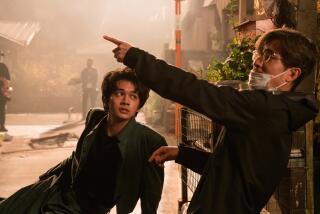IRVINE : Gift Swells UCI Library Asian Stacks
- Share via
Shonen magazine might look like a comic book, but it reads more like a sophisticated political journal.
Copies of the popular Japanese magazine, which uses cartoon images to make humorous points about the nation’s politics and culture, are on display this month at UC Irvine’s main library foyer.
The magazines are among the 7,000 Japanese periodicals and books recently donated to UCI’s East Asian collection by Sawako Noma, the president of Kodansha Ltd. in Toyko.
Thanks to the donation, UCI now has thousands of back issues of both Shonen magazine and the scholarly Gendai monthly, creating what is believed to be the most complete collection of these periodicals in the United States, said Judith Paquette, assistant university librarian for collections.
The books and magazines were selected by university officials in an effort to help researchers better understand contemporary Japanese society. Obtaining copies of Shonen magazine goes a long way toward reaching that goal because of the journal’s sharp-witted look at Japanese news and current affairs, Paquette said.
“These Japanese comics are a really important medium for popular culture,” she said. “It’s as legitimate a format as paperback or hardcover (books). . . . It’s in illustrated form but meant for adults.”
Bill Wong, UCI’s East Asian bibliographer, compared the magazine’s cartoons to those found in the New Yorker, saying the Shonen drawings take on everything from Japan’s political scene to its schools.
One cartoon mocks the Japanese corruption scandal by showing politicians exchanging expensive gifts at Christmastime. Another pokes fun at Japan’s rigorous education system by showing students studying hard, above a caption that reads, “The meaning of life: passing exams.”
Noma’s donation--valued at about $200,000--is the largest single gift ever given to the 60,000-volume East Asian collection, Wong said. In addition to the magazines, Noma’s gift includes Japanese novels, nonfiction works and essays.
The donation was arranged with the help of Dr. Minoru Omori, a regents’ professor in UCI’s history department.
Researchers and students hope to use the new materials in studying modern Japanese literature, arts, politics, economics and history. Because most of the material is written for Japanese consumption, it should offer American academics an added dimension of insight, officials said.
“It fits our needs and will be a resource for others as well,” Paquette said.
More to Read
Sign up for our Book Club newsletter
Get the latest news, events and more from the Los Angeles Times Book Club, and help us get L.A. reading and talking.
You may occasionally receive promotional content from the Los Angeles Times.










